Editor’s Note: The following assessment is from Kyiv Post journalists who covered the 15th annual Yalta European Strategy in Kyiv, held Sept. 13–15, and sponsored by Ukrainian billionaire oligarch Victor Pinchuk. For the fourth year, the Kyiv Post was a media partner of the event. People can form their own opinions from watching videos from the conference speakers at yes-conference.org
Winners
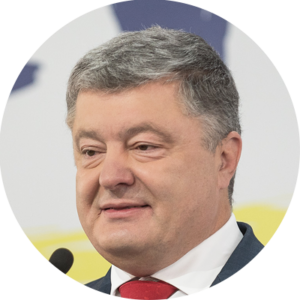
President Petro Poroshenko
Last year, Ukraine’s president looked to be on the political ropes and obstructing rule of law and standing in the way of needed reforms. He mocked the idea of an anti-corruption court, for instance, saying that America doesn’t have such an institution. Ex-U.S. Secretary of State John Kerry called him out on this issue, saying that, in America, all courts are anti-corruption courts. The contrast is stark: In Ukraine, judges are distrusted, take bribes and don’t dispense justice — often, to the contrary, they protect the corrupt in power. This year, however, Petro Poroshenko embraced the anti-corruption court and portrayed himself as its champion. He is obviously hoping that voters will have a short memory by the time they vote for a new president or vote to re-elect him in March 2019. Poroshenko’s chances of reelection are looking brighter all the time for at least two reasons: A weak political field with only singer Slava Vakarchuk as the potential fresh new face that Ukrainians are seeking. If Vakarchuk doesn’t run, Poroshenko’s top two challengers are ex-Prime Minister Yulia Tymoshenko and ex-Defense Minister Anatoly Grytsenko. Not only are they not new faces, they will have a hard time beating Poroshenko.
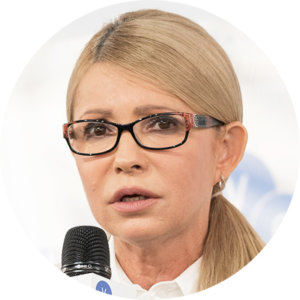
Yulia Tymoshenko
Member of the Ukrainian parliament, 2019 presidential candidate
The two-time prime minister looked good compared to moderator Stephen Sackur, who suffered from a lack of detailed knowledge about Ukrainian politics. She batted away his criticism of her opposition to hiking household gas prices, saying she’s all for market prices if the energy sector was truly competitive. Instead, it’s dominated by oligarchs who would gain an undeserved financial windfall from market prices, she said. The problem with Tymoshenko is that she’s Tymoshenko. Most people remember how she got her fortune in the 1990s under the tutelage of convicted crook and ex-Prime Minister Pavlo Lazarenko. Her stints as political prisoner under ex-President Leonid Kuchma and ex-President Viktor Yanukovych are unlikely to convince a majority of voters to back her candidacy. Rather than seeing new ideas from her, voters will likely see the same old Yulia — someone who many of them distrust and detest.
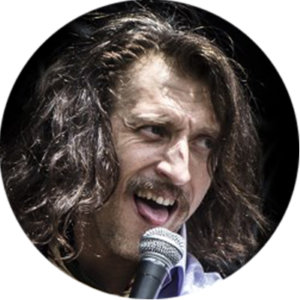
Gogol Bordello
American gypsy punk rock band
The YES Conference’s closing act showcased the best Ukraine has to offer: ramshackle creativity, screaming diversity, and a little bit of chaos. The Gogol Bordello, a New York-based “gypsy punk” band whose frontman, Eugene Hutz, hails from the Kyiv suburb of Boyarka, finished off the conference with a 90-minute set of the band’s greatest hits. Fans and the uninitiated alike were given the chance to not only experience the group’s signature mixture of Ukrainian folk, punk, and reggae up close, but also got to see aging Ukrainian and foreign muckety mucks let loose on the dance floor. The Gogol Bordello won the show with its energy — giving the conference’s exhausted participants a well-deserved sendoff.
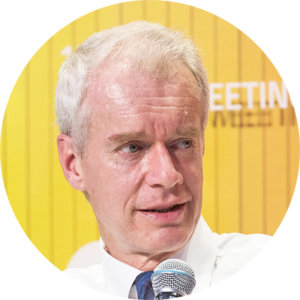
Stephen Sackur
Host of BBC World News HARDtalk
Stephen Sackur is more cheerful at the YES conference than he is on the BBC’s HARDtalk show. The skilled TV host knows how to keep an audience entertained and how to ask the right questions.
Perhaps he could have done a little more homework and asked the Ukrainians who are most likely to be running for president in Ukraine’s upcoming elections — Svyatoslav Vakarchuk, Yulia Tymoshenko and Anatoliy Grytsenko — tougher and more specific questions.
But he didn’t leave out the most important question, one that has become his stock question for four years running: Name one “big fish” put in jail for crime or corruption? Prosecutor General Yuriy Lutsenko gave the typical response of Ukrainian officials — shift the blame on someone else..
Sackur also gave a chance for another journalist, from the Kyiv Post, to ask a question to Lutsenko in front of the audience, a rarity at the YES conference.
Too bad Sackur wasn’t the moderator for President Petro Poroshenko. Instead, it was Richard Haas, president of the Council on Foreign Relations, who asked mundane questions.
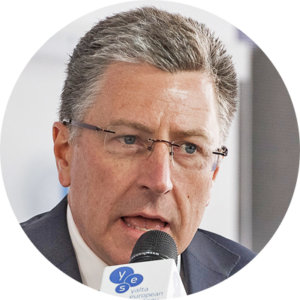
Kurt Volker
U.S. special envoy to Ukraine
While Kurt Volker lacks powers and hasn’t persuaded Russia to call off its war against Ukraine, he’s smoked out the Kremlin’s lies and articulated the truth of the situation so persuasively that Russian President Vladimir Putin has lost all credibility on the international stage when it comes to the Ukrainian issue.
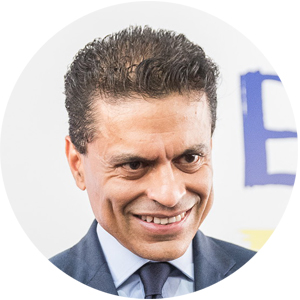
Fareed Zakaria
Host of CNN Fareed Zakaria GPS
Fareed Zakaria brings a charm and class wherever he goes and it was no different at the 15th YES conference in Kyiv. Zakaria, an Indian-American journalist who graduated from Yale in 1986, was also the managing editor of Foreign Affairs at the age of 28 and later got Ph.D. in government from Harvard University. But with such high academic ranks, Zakaria keeps a humble approach as he mingled among Ukraine’s elite. He’ll talk to anyone and retains a big smile all the time. And despite his understanding of global politics, Zakaria is still up-to-date on what is going on in Ukraine. He understands that Ukraine’s biggest problem is not the Kremlin but the country’s corruption. He is also no fan of U. S. President Donald Trump and has a strong suspicion of his president’s ties with the Russians.
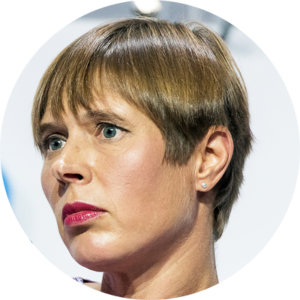
Kersti Kaljulaid
President of Estonia
The Estonian leader got one of the evening sessions on the first day of the YES conference but nonetheless managed to gather an audience and keep them hooked until the end. Estonia has been able to build a digital nation where 99 percent of public services are available online. But instead of just touting her country’s accomplishments, Kaljulaid spent most of her time explaining the advantages of technology for any society to the far less tech savvy former British Prime Minister Tony Blair using the most basic examples: “Mothers with babies can work from home, young girls from Africa can learn from the bookkeepers in the Netherlands, e-government increases government transparency,” etc.
When Kaljulaid spoke of Estonia’s first biobank of its citizens’ DNA, which helps study and prevent genetic diseases, and “e-identity,” which allows Estonians to vote from anywhere in the world, Blair looked intimidated. Compared to him, Kaljulaid appeared relatable and relevant. It clearly exposed the generation gap between them — both in age and political vision. Kaljulaid also mocked Blair for his tendency toward long-winded questions, saying “I will reply in a little less complex, housewife-ish way.” She also alluded to Britain’s traditional social class divisions, when talking about the equalizing power of technology and meritocracy.
“The best tool to fight populism is to create egalitarian education system. There are people who go to bad schools, then get bad jobs with bad salaries, and their kids go to bad schools. So there’s no social mobility,” Kaljulaid said. “And technology will help. Regardless where a child lives or regardless who their parents are, every child has a right to get education and be able to enter any university. I can’t define populism but I see people who have lost hope that their children will have a better future.”
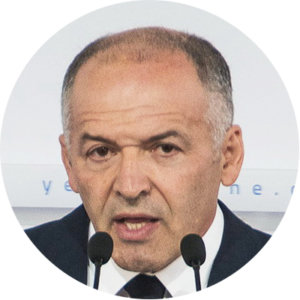
Victor Pinchuk
billionaire, oligarch
Victor Pinchuk is no saint despite pulling off the 15th annual Yalta European Strategy conference by hiring big names such as CNN host Fareed Zakaria, BBC host Stephen Sackur and U2 frontman Paul Hewson, better known as Bono.
Last year, the Kyiv Post grudgingly made Pinchuk as a winner of the event, and this year he’s a winner for the second year in a row because, aside from the Kyiv Post Tiger Conference (to which we’re biased in favor), YES is the best conference in Ukraine and has raised the nation’s profile internationally. Boycotting it, as the Kyiv Post did for its first several years, is foolhardy for journalists, given all the newsmakers and excellent debaters assembled in one room.
Pinchuk was also a sponsor in 2017 of the Kyiv Post Tiger Conference Top 30 Under 30 Awards, setting himself up — along with $125 million in charitable contributions — as a promoter of Ukraine’s younger generations. And he has certainly helped a lot of people.
But Pinchuk has a hard time winning favor in his home nation, no matter how much money he lays out for international celebrities.
People in Ukraine haven’t forgotten how he got rich under the autocratic decade-long reign of father-in-law Leonid Kuchma, president from 1994–2005, when nepotism, corruption and opacity ruled. People suffered while Pinchuk and the rest of the oligarch class came into billions of dollars while strangling competition in the economy and ensuring that the law served them, not the people. As usual, nobody brought up the Sept. 16, 2000, murder of journalist Georgiy Gongadze, in which Kuchma was the prime suspect, an investigation he and Pinchuk were well-positioned to obstruct and obfuscate.
Oligarchs create the impression that the economy needs them. But Western democracies work in a different way. Let Ukraine develop a strong middle class and the nation will attract Bono ourselves, but this time for a concert where hundreds of thousands of people can attend and not just the elite few.
Losers
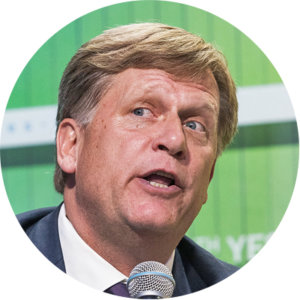
Michael McFaul
Former U. S. ambassador to Russia (2011–2014)
Michael McFaul, the former U.S. ambassador to Russia, would have a more receptive audience if he was less egotistical. No wonder Russian President Vladimir Putin couldn’t stand him. If it’s always all about Michael “Me” McFaul, as it is usually is when he talks, he quickly becomes insufferable.
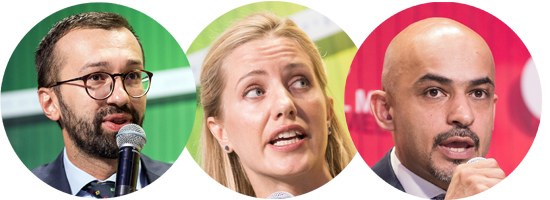
Sergii Leshchenko, Svitlana Zalishchuk, Mustafa Nayyem
Members of the Ukrainian parliament (2014–present)
These are three favorite reformers of the new generation of Ukrainian leaders and the Kyiv Post respects the trio for their moral courage, especially during the autocratic rule of President Viktor Yanukovych. But much more is expected of them in speeches, at conferences and, most importantly, in leading the nation. Their lunchtime speech at YES was full of platitudes about needing to create the rule of law, democratic institutions, fight corruption and so on. The remarks would have gone over well in 2014, the year that Yanukovych hightailed it to Russia during the EuroMaidan Revolution. But this is 2018, and the trio needs to deliver, including calling people out by name and rooting out all these corrupt schemes. Lest anyone forget, they are part of President Petro Poroshenko’s dominant 135-member faction, which has kept the oligarchy in place. Sometimes they seem too deferential to the powers that be and either too comfortable with the status quo or too enamored with their star status.
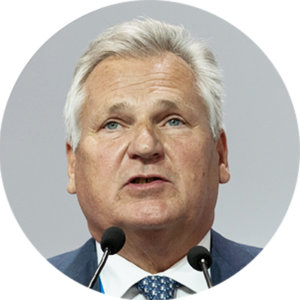
Aleksander Kwaśniewski
President of Poland (1995–2005); Chairman of the YES Board
Do the ends ever justify the means?
Maybe former Polish President Aleksandr Kwasniewski knows the answer. Halfway through the YES conference, news broke of Paul Manafort’s guilty plea. The former Party of Regions apparatchik’s guilty plea revealed that Kwasniewski had taken money from Manafort as part of the so-called “Hapsburg Group,” an assortment of former European politicians hired to lobby on behalf of the Party of Regions. In Kwasniewski’s case, however, he was not “former” anything — at the time he was allegedly taking cash from Manafort, he was on a supposedly independent European Parliament monitoring mission to investigate the prosecution of former Prime Minister Yulia Tymoshenko.
In Manafort’s and Kwasniewski’s defense, the work was done in favor of integration with the European Union, at the cost of Brussels agreeing to overlook the prosecution of former Prime Minister Yulia Tymoshenko and the mass looting of Ukraine.
The regime that Manafort and Kwasniewski effectively supported ended up going down in flames over its refusal to sign a political and economic association agreement with the European Union — but not before murdering more than 100 protesters during the EuroMaidan Revolution and robbing the country of $40 billion.
Yanukovych is gone, the association agreement is signed, and Tymoshenko is now free, while Kwasniewski is burnishing his reputation as someone only interested in making as much money as he can — from Pinchuk, from Manafort, from the shady Burisma energy company and from whoever else he is pocketing cash.
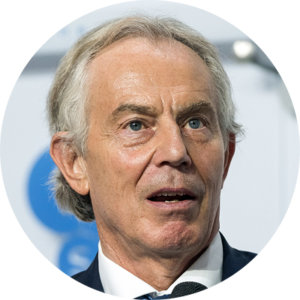
Tony Blair
United Kingdom prime minister (1997–2007)
He’s been in a non-stop pursuit of money, raking in millions of dollars while serving as an adviser to some of the most odious people on the planet, including Kazakhstan autocrat Nursultan Nazarbayev. We’re told that he’s heckled and jeered on the streets of London. No wonder he’s become such a globetrotter commanding six-figure honorariums. All the better to avoid staying in England.
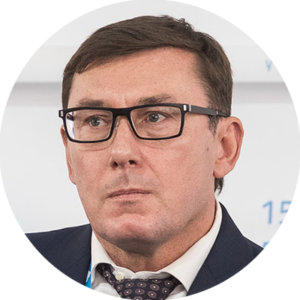
Yuriy Lutsenko
Prosecutor General (May 12, 2016–present)
The road from political prison to political sellout is an ugly one. Lutsenko gave another commanding performance in showing that he is clueless and incompetent about the job he’s supposed to be doing — prosecuting crime and corruption. He succeeds in using his post to protect the wealthy and powerful, no matter what crimes they’ve committed. He tried to claim at YES that he can only go after low-level corruption — at the deputy regional governor level and below. He said the big fish are for the corrupt and discredited Special Anti-Corruption Prosecutor’s Office. Not true, according to our understanding of the law. And, if true, the two agencies should be working together to target the biggest crimes against the state. But they’re not. Instead, Lutsenko is fishing around for journalists’ phone records as part of his mission for the corrupt elite to take down Artem Sytnyk, the head of the National Anti-Corruption Bureau of Ukraine, for the temerity of actually investigating corruption cases with independence and tenacity. Lutsenko leads a useless and corrupt prosecution service that should be dismantled. They should all be sent to study how real prosecutors work by taking lessons from U.S. special counsel Robert S. Mueller.
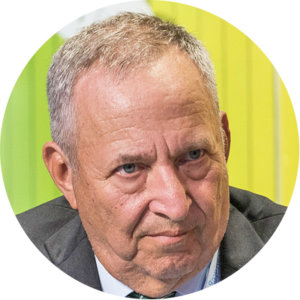
Larry Summers
Professor at Harvard University
The years have not been good to Larry Summers. Once hailed on the cover of Time magazine as part of the “Committee to Save the World,” the former U.S. treasury secretary’s reputation has plunged with the political fortunes of the inequality-spurring policies he designed. Financial deregulation in the United States led to the financial collapse, while he worked on the infamous “shock therapy” doctrines that left millions immiserated across the former Soviet Union.
And yet, judging from his remarks at YES, Summers is happy to cash in. Taking money from someone like Victor Pinchuk — whose Interpipe business began in the 1990s by trading on arbitrage between state and commercial pipe prices — would seem like it should be anathema to a supposed free market guru like Summers, but hey, it’s just business.
Most of the discussion centered on the presidency of America’s Donald Trump, whose election in 2016 still baffles. Summers did strike a note of contrition, albeit without recognizing any role he might have played in creating the conditions that led to Trump.
And yet, his advice evinced no reflection. Apart from desultory pleas to lessen massive wealth inequality through global taxation agreements, it was a mixture of subtly deflecting blame and more of the same policies for the “increasingly burdened” U.S. middle class (who did the burdening?) that’s he’s been advocating (and implementing) for decades. Even for someone with an already tarnished reputation, it was grim to get an up-close look at who’s been in the driver’s seat.
YES committee
The YES organizing committee needs to update its guest list and bring new faces. Every year we see a predictably similar roster of speakers who are “former” something or another. Some regular speakers, such as ex-United Kingdom Prime Minister Tony Blair and ex-NATO Secretary General Anders Fogh Rasmussen, bring less value to the conference with each passing year as they become more divorced from the realities that existed when they were in power. The conference is also over-scheduled and suffers other logistical flaws, including the lack of quiet rooms for interviewing and work, although the conference — as we’ve said repeatedly — is one of the best in Ukraine, which is why the Kyiv Post remains proud to be a media partner.
